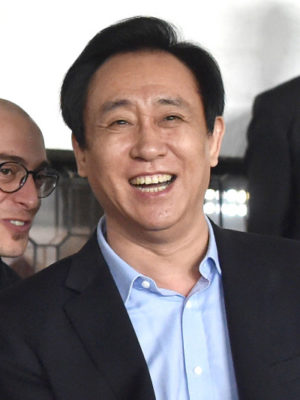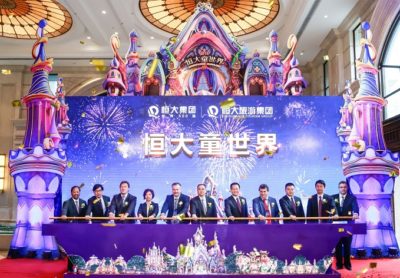
Taking on Disney is no laughing matter for Evergrande chairman Xu Jiayin
Less than two months after Dalian Wanda Group walked away from its ambitions to crush Disney in China’s theme park market, the country’s biggest developer has revealed a scheme to take on the Magic Kingdom with its own empire of amusement parks.
China Evergrande Group this week announced plans to expand its tourism portfolio to include 15 “Children’s World” theme parks across the country over the next two to five years, adding to an existing project in the city of Changsha.
The statement by the developer controlled by mainland billionaire Xu Jiayin directly challenges the Walt Disney Company by noting that each of its theme parks will feature 33 large-scale rides, compared to the typical Disney project which boasts just 18 to 22 such rides.
Evergrande Targets Lower-Tier Cities for Theme Park Network
Evergrande says its parks are geared to children from two to fifteen years old and will rely on a repertoire of characters and themes from Chinese and Western history to pull in China’s amusement-hungry masses. Each park aims to draw 15 to 20 million visitors per year and generate annual revenue of about RMB 20 billion ($3 billion) from tourism-related services. The statement provides no details about where the upcoming parks will be located, and Evergrande did not respond to multiple inquiries by Mingtiandi by the time of publication.

Evergrande announced its theme park ambitions at a press conference last Sunday
Evergrande has already announced its first Children’s World park in the Hunan provincial capital of Changsha this past January. At the time, the developer was said to be planning similar parks in Guizhou’s provincial capital of Guiyang, the city of Kaifeng in Henan, two more in Jiangsu province near Shanghai, and an Ocean Park in Jiangsu’s Qidong, according to a report in the South China Morning Post.
A company filing to the Hong Kong exchange in March revealed that Evergrande had two “Fairytale Land” projects under construction, one in the island province of Hainan, where the company is building a 7.18 million square metre artificial island with 28 commercial attractions. The other Fairytale Land was reported to be under construction in the city of Qidong in Jiangsu province, opposite the Yangtze River from Shanghai.
Evergrande’s Qidong theme park forms part of a 3.42 million square metre project that also includes a large-scale housing complex. With real estate markets lagging in many third-tier markets, China’s smaller cities have become eager for commercial projects that can help them to sell land and build taxable commercial bases. Developers such as Evergrande, and earlier Dalian Wanda, have in some cases been able to secure residential land at attractive discounts by agreeing to develop theme parks, medical centres or other potential magnet projects.
Wanda Exits China’s Amusement Park Market
Wanda, China’s largest commercial property developer, once boasted that its planned theme parks would outsell the $5.5 billion Disney Shanghai Resort that opened its doors in June of last year. But the property-and-entertainment conglomerate headed by Wang Jianlin dropped its amusement park dreams last month, selling a 91 percent stake in its 13 project portfolio of “cultural tourism” properties to Tianjin-based developer China Sunac for RMB 43.8 billion ($6.5 billion).
As part of the same deal, Wanda sold 77 hotels to Guangzhou’s R&F Properties, in a transaction intended to reduce leverage amid scrutiny from Chinese regulators. Two of Wanda’s tourism parks – in Xishuangbanna in Yunnan province and Hefei in Anhui province – have opened their doors while a third, the Wuhan Wanda Movie Park, was shuttered for renovations after struggling to attract visitors, nineteen months after opening in 2014.
Evergrande reported a first-half profit rise of 832 percent to RMB 18.8 billion, amid higher sales volume and selling prices for its properties. Focused on residential projects, Evergrande was China’s biggest developer by sales in 2016.
Leave a Reply